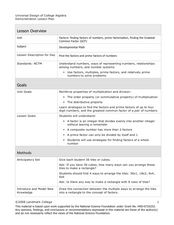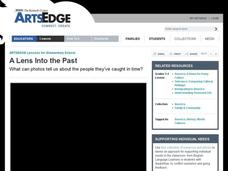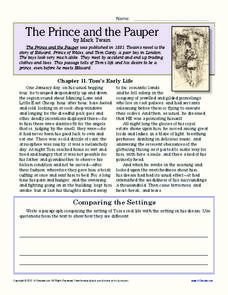Curated OER
Adhesives: How Sticky is Your Tape?
Students test the adhesive strength of different tapes. In this adhesive lesson plan, students conduct an experiment to test the shear strength of the adhesives, take measurements, record data, and draw conclusions to explain each...
Curated OER
Building Dreams??? Who is There to Help You?
Young scholars draw conclusions regarding personality based upon story events. The evaluate personalities based upon values and speculate on the effect individuals could have upon the future. They apply this analysis of motivation to...
Curated OER
Mathemafish Population
It's shark week! In this problem, young mathematically minded marine biologists need to study the fish population by analyzing data over time. The emphasis is on understanding the average rate of change of the population and drawing...
Curated OER
Find the Factors and Prime Factors
Show the class how to find the factors of numbers. They use a variety of strategies, including unifix cubes, to find the factors of a whole number. This resource includes clear procedure to follow. Included are an anticipatory set,...
Curated OER
A Lens into the Past
Explore the history of immigration through photographs. Scholars will view and discuss photographs depicting the culture and lifestyle of late 19th and early 20th century immigrants. They take pictures of current examples of culture in...
Curated OER
A Dream Of Classic Perfection
Students examine primary sources in order to draw conclusions about the influence of Greek classical art and philosophy on the French Revolution. They compare the goals of the French Revolution to those of Neoclassical artists.
Curated OER
Rivers Through Time
Students read or have the book A River Ran Wild read to them. They discuss and reflect on the messages presented in the book. Students use their listening comprehension skills to draw conclusions. Students articulate several examples of...
Curated OER
The Torah Tells...
Students extract and interpret information about the Torah text to draw conclusions about ancient Hebrew life. In this Torah lesson plan students research facts and complete worksheets about the Torah. Then as a class the students form a...
Curated OER
2.3.8 Conclusions and Further Research
Students are able to identify the components of the Conclusions and Further Research sections of the project and technical paper. They are able to identify the components of the Conclusions and Further Research sections of the project...
Curated OER
How to "Read" an Artifact
Students discuss the types of information they can get from artifacts. In groups, they practice "reading" artifacts and determining their usage. They use inferences to test against official information about certain pieces. They also...
Curated OER
Animation Pre-Production
Does your class love reading cartoons? Use their talents and interests to examine the process of writing a story they wish to tell through a cartoon. They develop the beginning, middle, and end of a story based on their original...
Alcohol Education Trust
Talk About Alcohol: How Much Alcohol is in a Drink?
Introduce your class to alcohol content. In order to become aware of the varying strengths of alcoholic drinks, class members complete a chart and plot a bar chart with the results. They make observations about the results.
Curated OER
Introduction to Victorian London and A Christmas Carol: Scrooge and Marley
Immerse your class in Dickens's London and classic story of A Christmas Carol. Here, a SMARTboard presentation and WebQuest build background of the setting for the novel (or the play A Christmas Carol: Scrooge and Marley.) Learning about...
K12 Reader
The Prince and the Pauper
A passage from Mark Twain's The Prince and the Pauper provides readers with a chance to demonstrate their ability to select evidence that shows the contrasts between the setting of Tom's real life and that of his dream life.
Stanford University
King Philip's War
King Philip's War was the crescendo of a violent period between the Pequot and English colonists. Using documents from English settlers, including a contemporary report on the conflict, learners explore the little-known period. They then...
Curated OER
What Do You Think? Analyzing Points of View About an Issue
"How might multiple perspectives of standardized testing impact me as a student?" is an example of an essential question that a researcher might use as a basis for this lesson on how to research and present a written stance on a...
Curated OER
Analyzing Two or More Nonfiction Texts
How does recognizing the author's purpose help you draw conclusions about a topic? Using two articles (both are attached), learners brainstorm why each author wrote each article. Are their purposes similar or different? Learners use a...
Kenan Fellows
Engineering Skills Through Problem Based Learning
Navigate the ups and downs of learning about energy. Future engineers consider how potential and kinetic energy apply to roller coasters. They design a roller coaster of their own and then use computer design software to showcase their...
Kenan Fellows
How Does an Unhealthy Diet Influence our Health and Well-Being?
You are what you eat, or so they say! After surveying family and friends on a week of eating habits, learners analyze the data for patterns. They compare different variables such as fats and cost, fats and calories, or fats and LDLs.
Discovery Education
Cool It!
Adjust the melting time of ice without varying the temperature! Learners experiment with different materials to decide how the materials affect the rate an ice cube melts. They then connect their findings to the conductivity of each...
Teach Engineering
Earthquakes Living Lab: Geology and Earthquakes in Japan
Sometimes it seems as if earthquakes hit the same places over and over again. Class members study Japan in order to determine why earthquakes keep happening there. Pairs work together to research and try to determine whether there are...
Chicago Botanic Garden
Plant Phenology Data Analysis
Scientists monitor seasonal changes in plants to better understand their responses to climate change, in turn allowing them to make predictions regarding the future. The last activity in the series of six has scholars analyze BudBurst...
Channel Islands Film
Island Rotation: Lesson Plan 4
Foster's Rule? Allopatric speciation? After watching West of the West's documentary Island Rotation, class members use Venn diagrams to compare endemic species on the Channel Islands with mainland related species. They then create a...
Science 4 Inquiry
Introducing the Types of Energy
Young scientists explore many different types of energy including light, heat, nuclear, sound, potential, and more. They match the types of energy and identify when energy transfers from one type to another.

























